| Listing 1 - 10 of 57 | << page >> |
Sort by
|
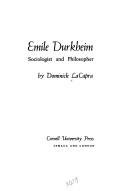
ISBN: 080140701X 9780801407017 Year: 1972 Publisher: Ithaca (N.Y.): Cornell university press,
Abstract | Keywords | Export | Availability | Bookmark
 Loading...
Loading...Choose an application
- Reference Manager
- EndNote
- RefWorks (Direct export to RefWorks)
Durkheim, Emile --- Durkheim, Émile, --- 316.253 --- #SBIB:316.20H32 --- Durkheim. Sociologisme--(sociologische scholen) --- De sociologie van Emile Durkheim: secundaire bronnen --- 316.253 Durkheim. Sociologisme--(sociologische scholen) --- Tʻu-erh-kan, --- Di︠u︡rkem, E., --- Durkheim, David Émile, --- Di︠u︡rkgeĭm, Ėmilʹ, --- Dyurukēmu, Emīru, --- Durkheim, Emilio, --- Dirkem, Emil, --- Durkheim, Émile, - 1858-1917
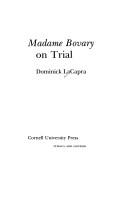
ISBN: 0801414776 9781501720017 1501720015 9780801414770 Year: 1982 Publisher: Ithaca, N.Y. Cornell University Press
Abstract | Keywords | Export | Availability | Bookmark
 Loading...
Loading...Choose an application
- Reference Manager
- EndNote
- RefWorks (Direct export to RefWorks)
In 1857, following the publication of Madame Bovary, Flaubert was charged with having committed an "outrage to public morality and religion." Dominick LaCapra, an intellectual historian with wide-ranging literary interests, here examines this remarkable trial. LaCapra draws on material from Flaubert's correspondence, the work of literary critics, and Jean-Paul Sartre's analysis of Flaubert. LaCapra maintains that Madame Bovary is at the intersection of the traditional and the modern novel, simultaneously invoking conventional expectations and subverting them.
Flaubert, Gustave --- Flaubert, Gustave, --- LITERARY CRITICISM / European / French.
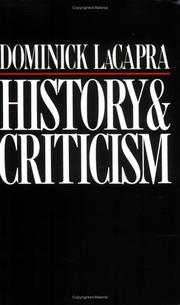
ISBN: 0801417880 9780801417887 0801493242 1501727443 Year: 1985 Publisher: London: Cornell university press,
Abstract | Keywords | Export | Availability | Bookmark
 Loading...
Loading...Choose an application
- Reference Manager
- EndNote
- RefWorks (Direct export to RefWorks)
History as a science --- Historiography --- Historiographie --- Historiography. --- Historical criticism --- History --- Authorship --- Criticism
Book
ISBN: 0801420334 0801495776 1501727478 Year: 1987 Publisher: Ithaca, N.Y.
Abstract | Keywords | Export | Availability | Bookmark
 Loading...
Loading...Choose an application
- Reference Manager
- EndNote
- RefWorks (Direct export to RefWorks)
Comparative literature --- Thematology --- 82:93 --- Literatuur en geschiedenis --- Fiction --- Literature and history. --- Politics and literature. --- History and criticism. --- 82:93 Literatuur en geschiedenis --- Literature and history --- Politics and literature --- Literature --- Literature and politics --- History and literature --- History and poetry --- Poetry and history --- History --- History and criticism --- Political aspects
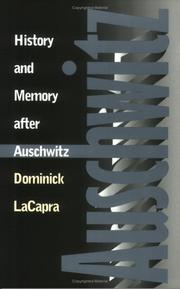
ISBN: 0801484960 0801434963 9780801484964 1501727451 Year: 1998 Publisher: Ithaca, NY London Cornell University Press
Abstract | Keywords | Export | Availability | Bookmark
 Loading...
Loading...Choose an application
- Reference Manager
- EndNote
- RefWorks (Direct export to RefWorks)
Dominick LaCapra focuses on the interactions among history, memory, and ethicopolitical concerns as they emerge in the aftermath of the Shoah. Particularly notable are his analyses of Albert Camus's novella The Fall, Claude Lanzmann's film Shoah, and Art Spiegelman's "comic book" Maus. LaCapra also considers the Historians' Debate in the aftermath of German reunification and the role of psychoanalysis in historical understanding and critical theory.
Holocaust, Jewish (1939-1945) --- Holocauste, 1939-1945 --- Historiography. --- Psychological aspects. --- Influence. --- Historiographie --- Aspect psychologique --- Influence --- 82:159.9 --- Literatuur en psychologie. Literatuur en psychoanalyse --- 82:159.9 Literatuur en psychologie. Literatuur en psychoanalyse --- Prison psychology --- Historiography --- Psychological aspects --- Holocaust [Jewish ] (1939-1945) --- Cognitive psychology --- Jewish religion --- World history --- anno 1940-1949 --- Shoah
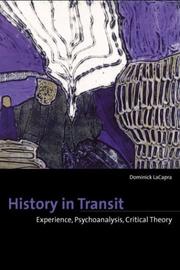
ISBN: 0801442540 0801488982 150172746X Year: 2004 Publisher: Ithaca, N.Y. : Cornell University Press,
Abstract | Keywords | Export | Availability | Bookmark
 Loading...
Loading...Choose an application
- Reference Manager
- EndNote
- RefWorks (Direct export to RefWorks)
History --- Personality and history --- Psychohistory --- Histoire --- Personnalité et histoire --- Psychohistoire --- Psychological aspects --- Philosophy --- Social aspects --- Aspect psychologique --- Philosophie --- Aspect social --- 82:93 --- 930.11 --- Literatuur en geschiedenis --- Filosofie van de geschiedenis. Geschiedenisfilosofie --- Personality and history. --- Psychohistory. --- Philosophy. --- Psychological aspects. --- Social aspects. --- 930.11 Filosofie van de geschiedenis. Geschiedenisfilosofie --- 82:93 Literatuur en geschiedenis --- Personnalité et histoire --- Psychoanalysis in historiography --- Child psychology --- Historiography --- Psychoanalysis --- Historiometry --- History and personality --- Annals --- Auxiliary sciences of history --- History, Modern
Book
ISBN: 9780801447860 9780801475153 0801475155 0801447860 0801458927 Year: 2009 Publisher: Ithaca ; London : Cornell University Press,
Abstract | Keywords | Export | Availability | Bookmark
 Loading...
Loading...Choose an application
- Reference Manager
- EndNote
- RefWorks (Direct export to RefWorks)
Dominick LaCapra's History and Its Limits articulates the relations among intellectual history, cultural history, and critical theory, examining the recent rise of "Practice Theory" and probing the limitations of prevalent forms of humanism. LaCapra focuses on the problem of understanding extreme cases, specifically events and experiences involving violence and victimization. He asks how historians treat and are simultaneously implicated in the traumatic processes they attempt to represent. In addressing these questions, he also investigates violence's impact on various types of writing and establishes a distinctive role for critical theory in the face of an insufficiently discriminating aesthetic of the sublime (often unreflectively amalgamated with the uncanny).In History and Its Limits, LaCapra inquires into the related phenomenon of a turn to the "postsecular," even the messianic or the miraculous, in recent theoretical discussions of extreme events by such prominent figures as Giorgio Agamben, Eric L. Santner, and Slavoj Zizek. In a related vein, he discusses Martin Heidegger's evocative, if not enchanting, understanding of "The Origin of the Work of Art." LaCapra subjects to critical scrutiny the sometimes internally divided way in which violence has been valorized in sacrificial, regenerative, or redemptive terms by a series of important modern intellectuals on both the far right and the far left, including Georges Sorel, the early Walter Benjamin, Georges Bataille, Frantz Fanon, and Ernst Jünger.Violence and victimization are prominent in the relation between the human and the animal. LaCapra questions prevalent anthropocentrism (evident even in theorists of the "posthuman") and the long-standing quest for a decisive criterion separating or dividing the human from the animal. LaCapra regards this attempt to fix the difference as misguided and potentially dangerous because it renders insufficiently problematic the manner in which humans treat other animals and interact with the environment.In raising the issue of desirable transformations in modernity, History and Its Limits examines the legitimacy of normative limits necessary for life in common and explores the disconcerting role of transgressive initiatives beyond limits (including limits blocking the recognition that humans are themselves animals).
Animals (Philosophy). --- Historiography. --- Human beings --- Intellectual life --- Violence --- Animal nature. --- History. --- Philosophy. --- Animals (Philosophy) --- Historiographie --- Vie intellectuelle --- Homme --- Animaux (Philosophie) --- Histoire --- Animalité --- Philosophie
Book
ISBN: 0416721206 9780416721201 Year: 1978 Publisher: London: Methuen,
Abstract | Keywords | Export | Availability | Bookmark
 Loading...
Loading...Choose an application
- Reference Manager
- EndNote
- RefWorks (Direct export to RefWorks)
Book
ISBN: 0801493617 1501727982 1501720015 9780801493614 Year: 1982 Publisher: Ithaca (N.Y.): Cornell university press,
Abstract | Keywords | Export | Availability | Bookmark
 Loading...
Loading...Choose an application
- Reference Manager
- EndNote
- RefWorks (Direct export to RefWorks)
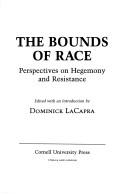
ISBN: 0801497892 0801425530 1501727486 Year: 1991 Publisher: Ithaca London : Cornell University Press,
Abstract | Keywords | Export | Availability | Bookmark
 Loading...
Loading...Choose an application
- Reference Manager
- EndNote
- RefWorks (Direct export to RefWorks)
Race in literature. --- African Americans in literature. --- Blacks in literature. --- Blacks --- Ethnicity. --- Race identity. --- African Americans in literature --- Blacks in literature --- Ethnicity --- Race in literature --- Ethnic identity --- Black identity --- Blackness (Race identity) --- Negritude --- Race identity of blacks --- Racial identity of blacks --- Negroes in literature --- Afro-Americans in literature --- Race identity --- Group identity --- Cultural fusion --- Multiculturalism --- Cultural pluralism --- Race awareness --- Race identity of Black people --- Racial identity of Black people --- Black people in literature. --- Black people --- Black persons --- Negroes --- Ethnology --- Noirs américains --- Noirs --- Race --- Ethnicité --- Dans la littérature --- Noirs américains --- Ethnicité --- Dans la littérature
| Listing 1 - 10 of 57 | << page >> |
Sort by
|

 Search
Search Feedback
Feedback About UniCat
About UniCat  Help
Help News
News